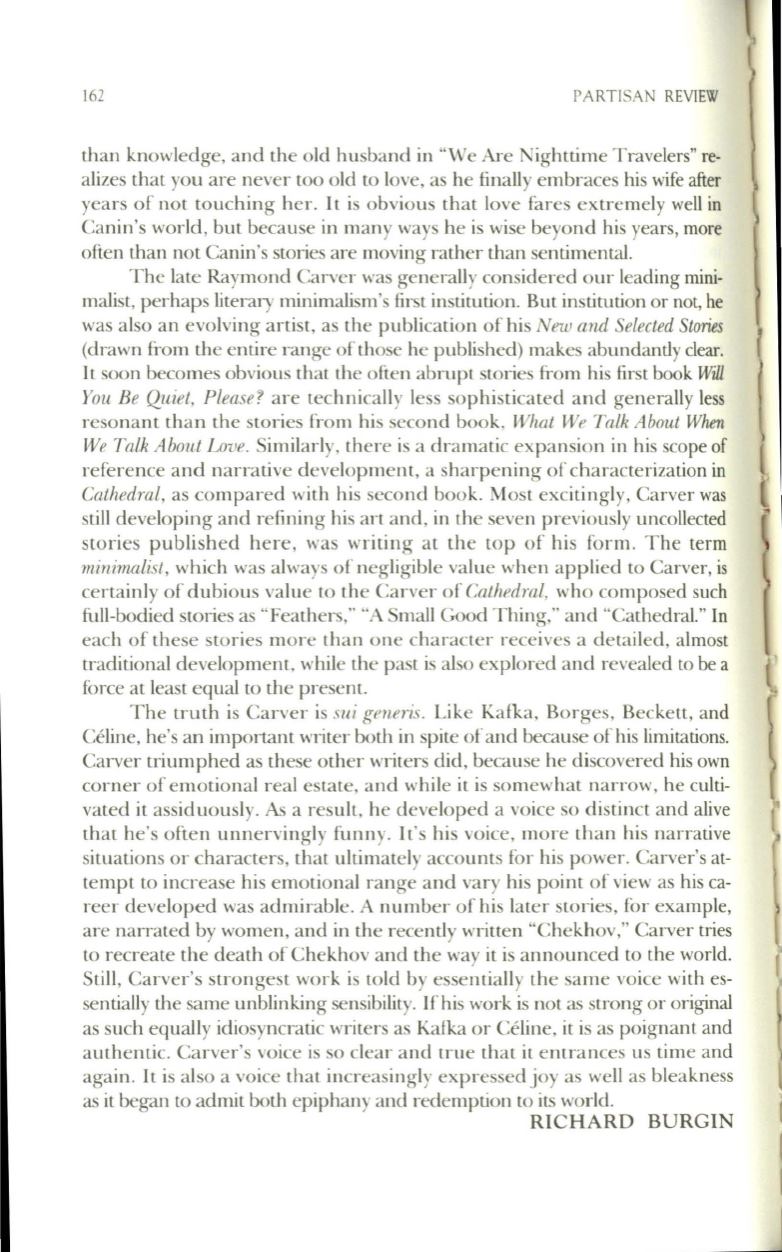
162
PARTISA REVIEW
than knowledge, and the old husband in "We Are ighttime Travelers" re–
alizes that you are never too old to love, as he finally embraces his wife after
yea rs of not touching her. It is obvious that love fares extremely well in
Canin's world, but because in many ways he is wise beyond his years, more
often than not Canin's stories are moving rather than sentimental.
The late Raymond Carver was generally considered our leading mini–
malist, perhaps literary minimalism's first institution. But institution or not, he
was also an evolving artist, as the publication of his
New and Selected Stories
(drawn from the entire range of those he published) makes abundantly dear.
It
soon becomes obvious that the often abrupt stories from his first book
Will
You Be Quiet, Please?
are technically less sophisticated and generally less
resonant than the stories from his second book,
What We Talk About
When
We Talk About Love.
Similarly, there is a dramatic expansion in his scope of
reference and narrative development, a sharpening of characterization in
Cathedral,
as compared with his second book. Most excitingly, Carver was
still developing and refining his art and, in the seven previously uncollected
stories published here, wa writing at the top of his form. The term
minimalist,
which was always of' negligible value when applied to Carver, is
certainly of dubious value
to
the Carver of
Cathrdml,
who composed such
full-bodied stories as "Feathers," "A Small Good Thing," and "Cathedral." In
each of these stories more than one character receives a detailed, almost
traditional development, while the past is also explored and revealed
to
be a
force at least equal to the present.
The truth is Carver is
sui
genais.
Like Kafka, Borges, Beckett, and
Celine, he's an important writer both in spite orand because of his limitations.
Carver triumphed as these other writers did, because he discovered his own
corner of emotional real estate, and while it is somewhat narrow, he culti–
vated it assiduously. As a result, he developed a voice so distinct and alive
that he's often unnervingly funn y. It's his voice, more than his narrative
situations or characters, that ultimately accounts for his power. Carver's at–
tempt to increase his emotional range and vary his point of view as his ca–
reer developed was admirable. A number of his later stOI-ies, for example,
are narrated by women, and in the recently written "Chekhov," Carver tries
to recreate the death of Chekhov and the way it is annou nced
to
the world.
Still, Carver's strongest work is told by essentially the same voice with es–
sentially the same unblinking sensibility. Ifhis work is not as strong or original
as such equally idiosyncratic writers as Kafka or Celine, it is as poignant and
authentic. Carver's voice is so clear and true that it entrances us time and
again. It is also a voice that increasingly exp ressed joy as well as bleakness
as it began to admit both epiphany and redemption to its world.
RICHARD BURGIN


